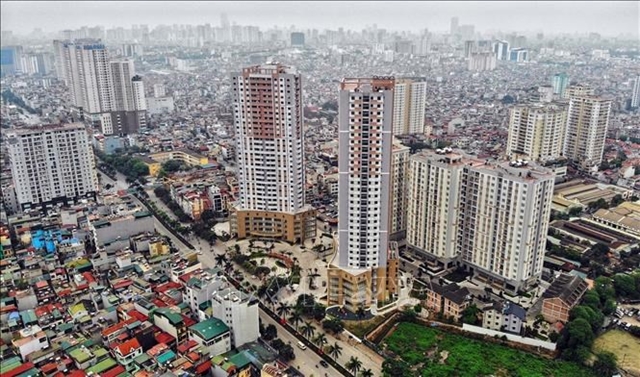With a total registered capital of nearly US$1.6 billion during January-August, real estate continued to rank third among 18 sectors in attracting foreign investment (FDI).

With a total registered capital of nearly US$1.6 billion during January-August, real estate continued to rank third among 18 sectors attracting foreign direct investment (FDI).
Although the figure was much lower than the US$2.87 billion in the same period last year, experts said it was reasonable as the impact of the COVID-19 pandemic had made it difficult for investors to take fact-finding tours and make investment decisions.
However, the industrial property segment is still considered a bright spot with new industrial zones established and key industrial projects beginning operations.
This year has witnessed new M&A deals and improvement in industrial land supply. The largest manufacturing projects in the first half of 2021 came from Hong Kong (China) and Singaporean investors that targeted northern Quang Ninh and Bac Giang provinces.
According to Savills Hong Kong, Viet Nam is still an attractive investment destination for foreign investors. In the context of the complicated developments of the pandemic, Viet Nam is the only country in the world that has been upgraded to a positive rating by all three international credit rating agencies: Moody's, S&P and Fitch.
Foreign investors such as Japan, the Republic of Korea and Singapore that have a strategy of expanding and diversifying investment channels look to emerging markets or frontier markets like Viet Nam to seek profits, Savills experts said.
Economist Dinh Trong Thinh attributed an increase in FDI inflows into Viet Nam 's real estate sector to political stability, positive economic growth, stable inflation, no major fluctuations in the financial and monetary market and high determination to fight the COVID-19 pandemic.
In addition, the urbanisation process in Viet Nam, a rapid increase in the urban population and rising per capita income, had also created more room for development of the property sector, he added.
Experts said that the signing of many free trade agreements, most recently the Comprehensive and Progressive Agreement for Trans-Pacific Partnership (CPTPP), the EU-Viet Nam Free Trade Agreement (EVFTA) and the Regional Comprehensive Economic Partnership (RCEP), had made Viet Nam an attractive destination for many foreign investors.
In Viet Nam's real estate market, leasing demand also recorded positive signals, with the amount of absorption in HCM City and Ha Noi in the first two quarters of 2021 close to pre-pandemic levels.
Although this was considered an improvement compared to the negative absorption rate of last year, experts said the segment still faced challenges in the last months of this year because Viet Nam was continuing to apply strict measures to control the disease, which lead to a very limited possibility of growth in rental price in the last months of the year.
The new variants of COVID-19, with restriction measures in many markets, continue to be a major risk affecting the economy and real estate market of the Asia-Pacific region in the next 12 months, especially for emerging economies in Asia, CBRE said.
Therefore, experts expect the governments of Asia - Pacific countries to maintain an appropriate monetary policy to support economies in a fragile recovery stage. Accordingly, the low interest rate environment will aid continued investment in cumulative yielding assets such as real estate.
This trend is reflected by the fact that investment volume has grown far beyond rental activity, said Dr Henry Chin, global head of Investor Thought Leadership & Head of Research at CBRE Asia Pacific.
CBRE's survey in the Asia-Pacific market showed that this year, office leasing activity was gradually improving, as rental demand had recovered compared to the previous year. The absorption rate increased by about 20 per cent in the first half of 2021, driven by strong performance in the North Asian market.
Full-year rental demand is expected to increase by 10-15 per cent over the same period last year, higher than the 5 percent forecast at the beginning of the year. Markets that are still maintaining positive performance include Singapore, Taipei (China), Seoul (the Republic of Korea).
According to Ada Choi, head of Leasing Operations Research, Intelligence Data Management at CBRE Asia Pacific, office tenants in the Asia-Pacific region will continue to have an advantage for the remainder of the year as 60 per cent of the year's new supply is expected to come into operation at this time.
Thus, they should renegotiate the lease or consider moving offices to selected locations of better quality, while being able to ensure lease agreements have more flexible terms, she said.
For the owners of office buildings, this is the time to prioritise ensuring occupancy rates by offering attractive terms to attract good quality tenants, said Ada Choi.
The CBRE forecasts that rental fees in the Asia-Pacific region will stabilise in 2022, in which fees at shopping centres serving daily necessities will have a stronger recovery.
For the Vietnamese market, although retail sales have recovered from the first quarter of this year, most retail sectors, except for essential items, experienced a decrease in sales growth in the second quarter when Viet Nam imposed a period of social distancing in many provinces and cities in both the north and south, it said.
Faced with the situation, many retailers have turned to online sales. This is forecast to be the new retail business standard and is welcomed by both shopping centres and retailers as Viet Nam gradually overcomes the pandemic.
Notably, CBRE experts predicted that rental prices will have a strong recovery in the south. Regarding the northern region, although most investors and tenant sentiment is quite positive, the large supply in the next two years will make landlords likely prefer a high occupancy rate rather than rental growth, they said. — VNS





